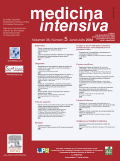
Medicina Intensiva
Scope & Guideline
Transforming Intensive Care Through Innovative Findings
Introduction
Aims and Scopes
- Acute and Critical Illness Management:
Research addressing the management of conditions such as acute respiratory distress syndrome (ARDS), septic shock, and other critical illnesses, emphasizing therapeutic strategies and outcomes. - Technological Advancements in Critical Care:
Investigations into the application of advanced technologies, including mechanical ventilation, extracorporeal membrane oxygenation (ECMO), and ultrasound in critical care settings. - Multidisciplinary Approaches in Intensive Care:
Studies that explore collaborative practices among various healthcare professionals in the ICU, highlighting the importance of teamwork in improving patient outcomes. - Ethical and Legal Aspects of Intensive Care:
Examinations of the moral complexities and ethical dilemmas faced by intensivists, particularly in the context of organ donation, end-of-life care, and resource allocation. - Impact of COVID-19 on Intensive Care Practices:
Research focused on the COVID-19 pandemic's implications for ICU protocols, patient management, and long-term outcomes in critically ill patients. - Patient and Family Outcomes:
Explorations of post-intensive care syndrome, quality of life, and the psychosocial aspects affecting patients and their families after critical illness. - Infection Control and Antibiotic Stewardship:
Studies on the management of infections in critically ill patients, focusing on antibiotic resistance, treatment strategies, and infection prevention protocols.
Trending and Emerging
- COVID-19 Related Research:
A significant number of studies focus on the impacts of COVID-19 on ICU practices, patient outcomes, and long-term sequelae, highlighting the ongoing relevance of this global health crisis. - Innovations in Respiratory Support:
Research into novel respiratory support methods, including high-flow nasal cannula and non-invasive ventilation strategies, has surged as practitioners seek effective alternatives to traditional mechanical ventilation. - Artificial Intelligence and Machine Learning Applications:
The integration of AI and machine learning in predicting outcomes and personalizing treatment in the ICU is gaining traction, reflecting the push towards data-driven decision-making in critical care. - Long-term Outcomes and Follow-up Care:
Increasing attention is being paid to the long-term impacts of critical illness on patients, including post-intensive care syndrome and the need for ongoing rehabilitation and mental health support. - Ethics in Critical Care:
A growing discourse surrounding ethical issues in intensive care, particularly in relation to resource allocation, end-of-life decisions, and the moral implications of critical care practices, is becoming more prominent.
Declining or Waning
- Traditional Ventilation Strategies:
Research on conventional mechanical ventilation techniques has decreased as newer methods and technologies, such as high-flow nasal cannula and non-invasive ventilation, gain prominence. - Single-Disease Focus Studies:
Studies concentrating solely on specific diseases or conditions, such as isolated pneumonia or singular sepsis types, are becoming less common as there is a shift toward more integrative and multidisciplinary approaches. - Basic Clinical Procedures:
Publications focusing on basic clinical procedures in the ICU, such as standard intubation techniques, are declining as the field moves toward more complex and technology-driven methods of patient management. - Pharmacological Management of Common Conditions:
Research dedicated to standard pharmacological interventions for common ICU conditions is waning, likely due to a growing emphasis on personalized medicine and tailored therapeutic approaches.
Similar Journals
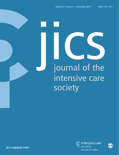
Journal of the Intensive Care Society
Advancing Critical Care KnowledgeThe Journal of the Intensive Care Society, published by SAGE Publications Ltd, serves as a premier platform for disseminating cutting-edge research and advancements in the field of critical care and intensive care medicine. With its ISSN of 1751-1437, this influential journal holds a distinguished position, currently ranked in the Q2 category for Critical Care and Intensive Care Medicine and Q1 in Critical Care Nursing, showcasing its significant impact within the academic community. The journal caters to a diverse audience including researchers, healthcare professionals, and students, by providing insightful articles that inform best practices and enhance patient care in intensive settings. It boasts impressive Scopus ranks, listed as 4th out of 27 in Critical Care Nursing and 32nd out of 110 in the broader category of Critical Care Medicine, reflecting its commitment to excellence. With content available from 2010 through to 2024, the Journal of the Intensive Care Society is essential for those looking to stay at the forefront of critical care innovation and research.
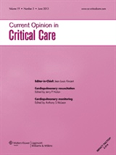
Current Opinion in Critical Care
Elevating patient care through impactful research.Current Opinion in Critical Care, published by Lippincott Williams & Wilkins, is a leading journal in the field of Critical Care and Intensive Care Medicine. With an ISSN of 1070-5295 and an E-ISSN of 1531-7072, this esteemed journal has been committed to disseminating high-quality and impactful research since its inception in 1996. The journal proudly ranks in the top quartile (Q1) of its category for 2023, affirming its position among the premier publications in critical care, with a Scopus ranking of #25 out of 110, placing it in the 77th percentile. Current Opinion in Critical Care offers essential insights, reviews, and discussions on the latest trends and best practices in the field, catering to the needs of researchers, clinicians, and students alike. Though it does not provide open access options, its contributions are pivotal in shaping patient care approaches and advancing clinical outcomes in critical care settings.

Critical Care and Resuscitation
Uniting scholars to enhance the future of patient care.Critical Care and Resuscitation is a premier peer-reviewed journal published by Elsevier, focusing on the dynamic fields of Anesthesiology, Critical Care, and Emergency Medicine. Established in Australia, this journal has been a significant contributor to scholarly research since its inception in 1999, maintaining a strong reputation with a commendable impact factor, evidenced by its Q1 quartile rankings across its relevant categories for 2023. The journal's commitment to disseminating high-quality research is reflected in its elite standings: it ranks #7 out of 109 in Emergency Medicine, #12 out of 136 in Anesthesiology, and #16 out of 110 in Critical Care. Aimed at researchers, clinicians, and healthcare professionals, Critical Care and Resuscitation provides a vital platform for the latest advancements in patient care and clinical strategies, making it an essential resource for those eager to stay at the forefront of these critical disciplines. Although lacking Open Access options, its rigorous peer-review process ensures the publication of valuable insights that shape current practices and influence future developments in healthcare.

Annals of Intensive Care
Fostering collaboration for the future of critical care.Annals of Intensive Care is a premier, peer-reviewed journal dedicated to advancing the field of critical care and intensive care medicine. Published by Springer since 2011, this open-access journal is renowned for disseminating high-quality research and clinical studies that inform and influence practice in intensive care settings worldwide. With an impressive impact factor and a prestigious Q1 ranking in its category, it ranks #6 out of 110 in Critical Care and Intensive Care Medicine, placing it in the 95th percentile of its field according to Scopus. The journal aims to foster collaboration among researchers, clinicians, and policymakers by providing a platform for innovative research findings, case studies, and thought-provoking reviews. Addressed to an international audience committed to improving patient outcomes in critical care, Annals of Intensive Care plays a crucial role in shaping the future of intensive care medicine with its commitment to excellence in research and scholarship.
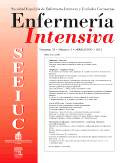
Enfermeria Intensiva
Advancing Critical Care Through Innovative Nursing InsightsEnfermeria Intensiva, published by Elsevier Science Inc, is a highly regarded journal in the fields of Advanced and Specialized Nursing as well as Critical Care and Intensive Care Medicine. With an impressive track record spanning from 1994 to 2024, this journal serves as a vital resource for researchers, healthcare professionals, and students dedicated to enhancing the quality of patient care in critical settings. It holds a coveted Q2 ranking in multiple nursing categories as of 2023, reflecting its influence and contribution to the ongoing discourse in nursing practices. Although currently not an open access journal, it continues to provide intricate insights into both fundamental skills and specialized techniques essential in intensive nursing care. By bridging research and practical application, Enfermeria Intensiva plays a pivotal role in advancing knowledge and improving outcomes in critical care environments.
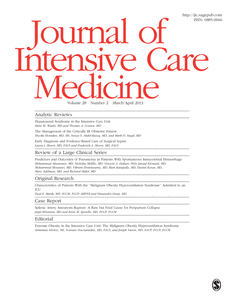
JOURNAL OF INTENSIVE CARE MEDICINE
Transforming Intensive Medicine ResearchJOURNAL OF INTENSIVE CARE MEDICINE, published by SAGE PUBLICATIONS INC, is a leading peer-reviewed journal dedicated to advancing the field of critical care and intensive medicine. With an ISSN of 0885-0666 and an E-ISSN of 1525-1489, this esteemed journal showcases innovative research, clinical practices, and synthesis of knowledge that informs the complexities of patient care in intensive settings. Recognized for its exceptional impact, it holds a prestigious Q1 ranking in the Critical Care and Intensive Care Medicine category, landing in the upper 15% of its field according to Scopus rankings. Celebrating over three decades of publication since its inception in 1986, the journal serves both as a resource for seasoned professionals and a platform for emerging researchers eager to contribute to evidence-based practice. Although not open access, the journal ensures that critical insights and advancements are accessible to a broad audience, fostering a collaborative environment that is essential for the evolution of intensive care protocols and the enhancement of patient outcomes. With its commitment to excellence, the JOURNAL OF INTENSIVE CARE MEDICINE stands out as an invaluable resource that continues to shape the future of healthcare in critical domains.
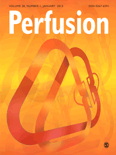
PERFUSION-UK
Connecting Disciplines for Enhanced Clinical PracticesPERFUSION-UK is a distinguished academic journal published by SAGE Publications Ltd, focusing on advanced topics in the fields of nursing, cardiology, and radiology, among others. With an ISSN of 0267-6591 and an E-ISSN of 1477-111X, this journal serves as a crucial platform for disseminating vital research and innovative practices in both theoretical and applied aspects of perfusion science. Operating from the United Kingdom, it has an impressive history, converging years from 1986 to 2024. In the 2023 category quartiles, it has secured a Q2 ranking in Advanced and Specialized Nursing, revealing its strong reputation in the nursing community, while also ranking Q3 in cardiology and other medical specialties, which highlights its multidisciplinary significance. With a commendable Scopus ranking positioning it favorably among its peers, PERFUSION-UK is committed to providing researchers, professionals, and students access to cutting-edge studies and practices, ultimately aiming to enhance patient care and safety in clinical settings.

Anesteziologie a Intenzivni Medicina
Advancing the Frontiers of Anesthesia and Critical CareAnesteziologie a Intenzivni Medicina is a pivotal Czech journal dedicated to the fields of anesthesiology, critical care, and intensive medicine. Published by SOLEN SRO, this journal plays a crucial role in disseminating essential research and advancements in these vital areas of medicine. With the ISSN 1214-2158 and E-ISSN 1805-4412, it has been in publication since 2003, showcasing a wealth of knowledge that is particularly relevant to the clinical practices in the Czech Republic and beyond. Although currently classified in the Q4 quartile for both anesthesiology and critical care disciplines, the journal is committed to fostering high-quality research and clinical discussions. Researchers and healthcare professionals can benefit from its content that encompasses various aspects of patient care and procedural developments. This journal is a valuable resource for those aiming to stay updated within the fast-evolving landscape of anesthesiology and intensive medicine, despite its limited open access options. As it progresses towards its 2024 convergence year, Anesteziologie a Intenzivni Medicina strives to elevate its impact and relevance in the medical community.
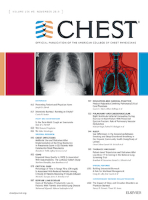
CHEST
Exploring the frontiers of cardiology and pulmonary medicine.CHEST is a premier journal published by Elsevier, focusing on the vital fields of cardiology, critical care, and pulmonary medicine. Established in 1970, this esteemed journal has continually provided authoritative research, reviews, and clinical studies, catering to a global audience of healthcare professionals, researchers, and students. With an impressive impact factor, CHEST ranks in the top quartile (Q1) across its core categories according to the latest Scopus metrics, securing its position as a leading resource within cardiology (Rank #16), pulmonary (Rank #9), and critical care (Rank #8). Published quarterly, it offers a wealth of knowledge essential for advancing understanding and improving patient outcomes in these critical areas of healthcare. Researchers and practitioners are encouraged to submit their work, contributing to the ongoing discourse that shapes innovative practices and policies in respiratory and cardiovascular health.

INTENSIVE CARE MEDICINE
Delivering Cutting-Edge Discoveries in Intensive Care MedicineINTENSIVE CARE MEDICINE is a premier academic journal in the field of critical care and intensive care medicine, published by SPRINGER. With an impressive HIndex and a remarkable impact factor, this journal consistently ranks in the top quartile of its category, achieving Q1 status for 2023. Spanning over four decades since its inception in 1977, it serves as a crucial platform for disseminating groundbreaking research and clinical advancements that shape the future of intensive care. Notably, it holds a distinguished position in the Scopus rankings, placed #1 out of 110 in its field, reflecting its importance and influence among researchers and clinicians alike. Although it is not an open-access journal, it offers various subscription options, ensuring wide accessibility to its high-quality content. The journal is dedicated to enhancing knowledge and practices within the critical care community, making it an indispensable resource for practitioners, researchers, and students pursuing excellence in intensive care medicine.